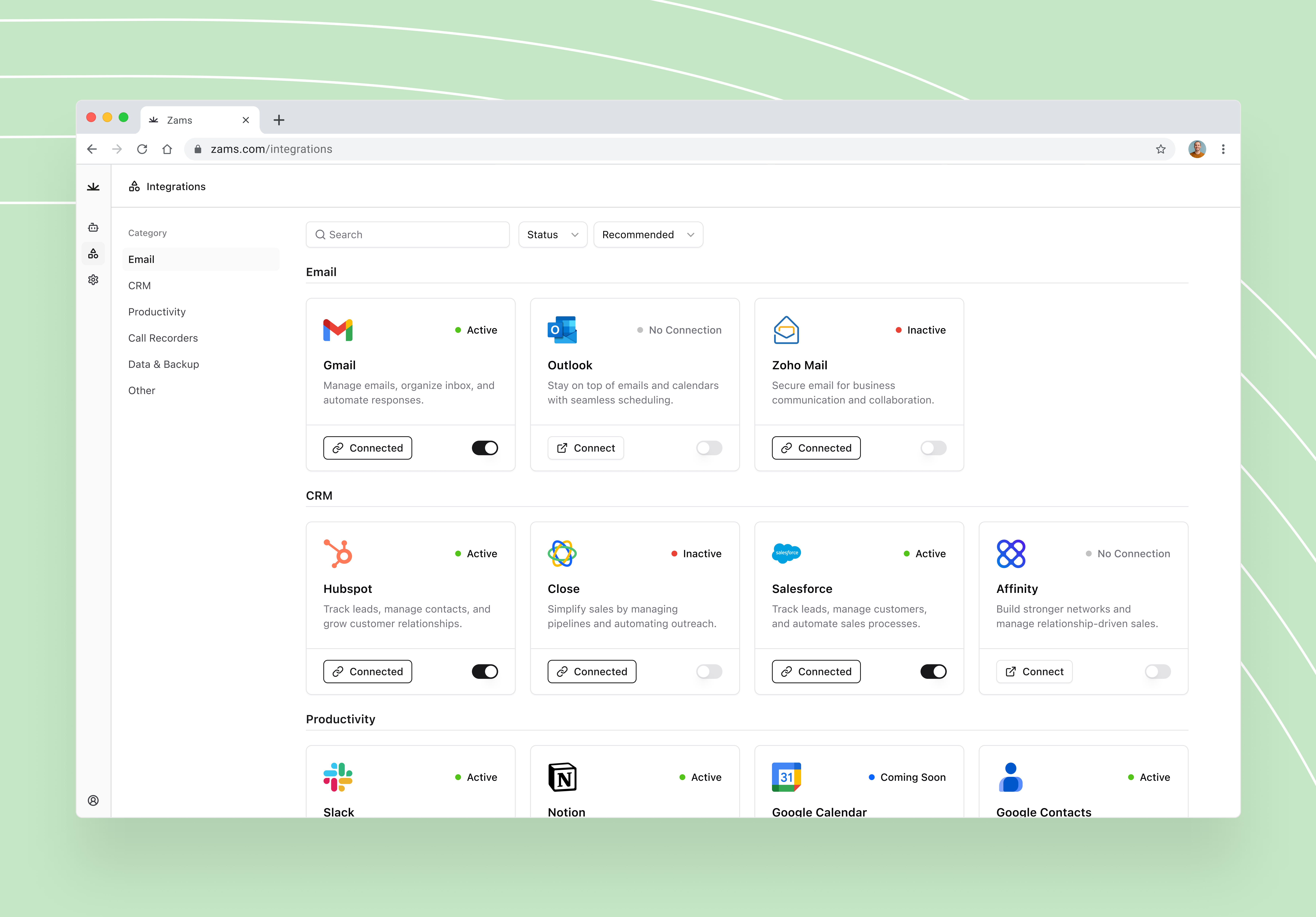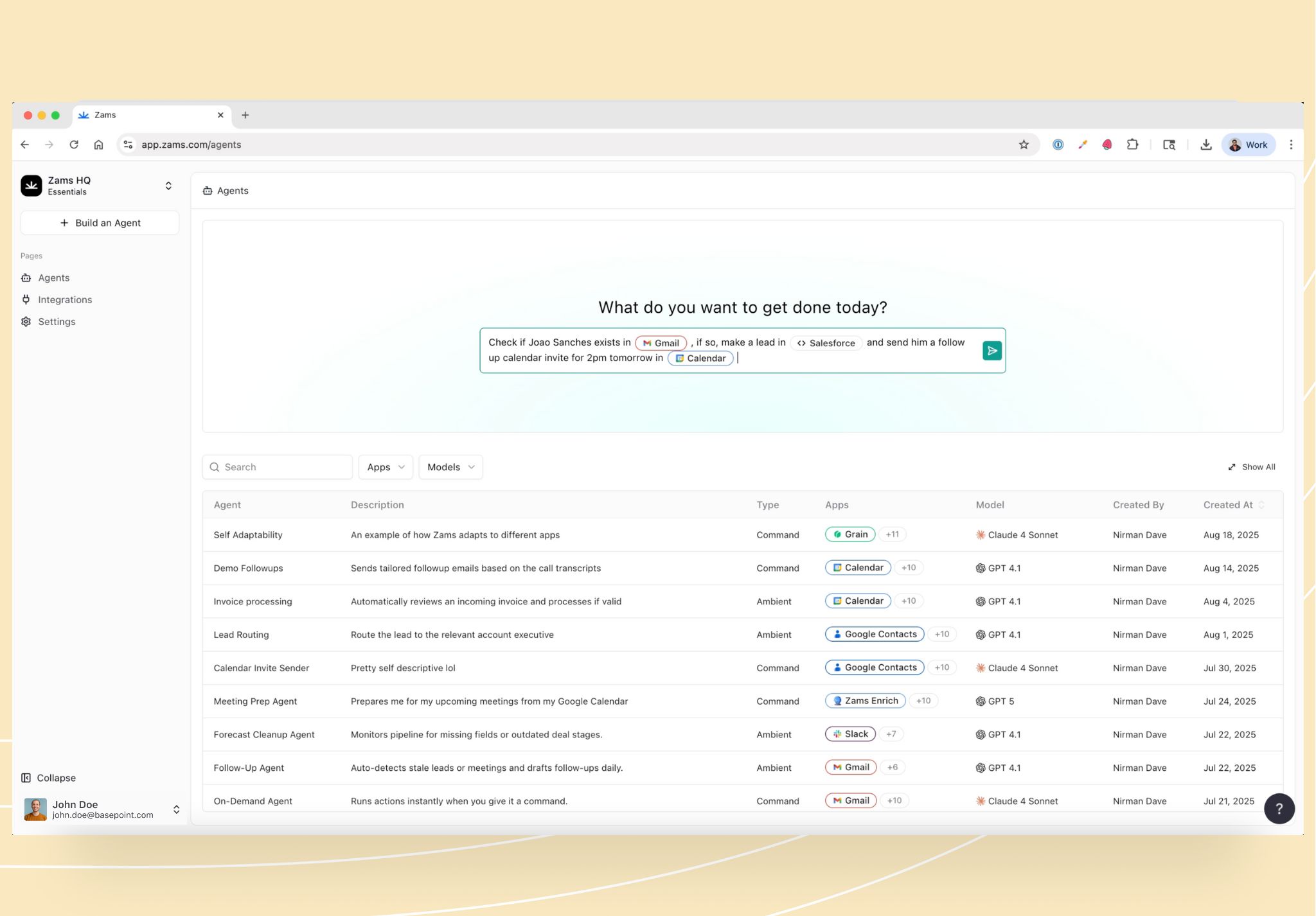An Introduction to Automation Services
In today’s fast-paced digital world, businesses are turning to automation services to stay competitive and efficient. Leveraging automation provides a strategic advantage, giving businesses a competitive edge in their industry. By reducing manual work and streamlining processes, business automation allows teams to focus on high-value tasks that drive results. With the right productivity tools, companies can scale faster, improve accuracy, and enhance overall performance. Zams automates the workflows that slow businesses down - boosting efficiency, driving productivity, and creating leverage that scales growth.
Unlock Productivity and Growth With Zams Automation Services
Boost productivity, cut manual work, and fuel business growth with automation. See how Zams automates workflows across 100+ tools.
What Are Automation Services?
Automation services like Zams refer to technology-driven solutions that replace repetitive manual tasks with smart, efficient systems. These solutions create automated workflows and processes, increasing efficiency and reducing manual effort. From workflow automation that simplifies day-to-day operations to customer service automation like chatbots, these tools help businesses save time and reduce errors. Other common forms include marketing automation for campaigns and HR automation for recruitment and payroll, making them essential in modern business process automation.

Benefits of Automation Tools for Productivity
One of the biggest advantages of automation services is their ability to reduce manual tasks and minimize errors. Automation also helps maintain high quality and consistency in business processes by standardizing workflows and ensuring reliable results. By automating repetitive processes, businesses can streamline operations and free up employees to focus on more strategic work. This not only helps to improve productivity but also ensures faster turnaround times and greater overall efficiency with automation. Learn how you can easily integrate Zams into your workflow today.
How Automation Services Drive Business Growth
Beyond boosting productivity, automation plays a critical role in fueling business growth with automation. By lowering costs and offering scalability, companies can expand operations without dramatically increasing overhead. Automation also enhances customer experiences and gives teams more time to focus on strategy and innovation - key growth strategies for long-term success. Additionally, automation services help businesses maintain a competitive edge in their industry by enabling them to adapt quickly to changing market demands and standards.
Key Areas Where Process Automation Services Can Be Applied
Automation services can transform nearly every aspect of business operations. From marketing automation services like email campaigns and social media scheduling, to sales automation that keeps CRM data up to date and nurtures leads, the impact is wide-reaching. Businesses can also benefit from finance automation for invoicing and payroll, including automating the process of sending invoices and documents to clients, streamlining client-related workflows and improving service efficiency. Customer service automation, such as chatbots and ticketing systems, improves availability for customers by providing instant, reliable support and enhances customer experiences and satisfaction for customers.
Choosing the Right Automation Services for Your Business
Selecting the best automation services starts with understanding your company’s unique goals and challenges. Factors like cost, ease of integration, scalability, ongoing support, and the quality and reliability of process controls and integrated control systems should all be considered before choosing automation solutions. Popular automation software platforms provide a wide range of features, allowing businesses to streamline workflows and maximize efficiency in the areas that matter most.

Measuring Automation Success Via Production Processes
Measuring the success of automation initiatives is essential for businesses aiming to maximize the value of their automation software and tools. By tracking key performance indicators (KPIs) such as increased productivity, reduced operational costs, and enhanced customer service, companies can assess the impact of automation across various business functions. Analyzing data from production processes and workflows allows organizations to pinpoint where automation has delivered the greatest efficiency gains and where further improvements can be made. Automation service providers often offer analytics and reporting features to help businesses evaluate their automation strategies and make data-driven decisions for future projects. In industries with complex production processes, these insights are invaluable for streamlining operations and ensuring that automation investments continue to drive measurable business results.
Overcoming Automation Challenges
Successfully implementing automation tools and software requires businesses to address several common challenges. Integrating new automation systems with existing infrastructure can be complex, especially when managing repetitive tasks across multiple business functions. Scalability and flexibility are also critical, as companies need automation solutions that can grow and adapt alongside their evolving needs. By partnering with experienced automation service providers and utilizing low-code platforms, businesses can simplify integration, reduce deployment costs, and ensure their systems remain agile. Employee training is another key factor - empowering teams to manage and maintain automation systems helps minimize errors and downtime. In the era of cloud resources, automation can further optimize the deployment and management of IT assets, leading to greater efficiency and cost savings across the organization.
Best Practices for Automation
To fully realize the benefits of automation, businesses should follow a set of best practices. Start by clearly defining business objectives and identifying the processes where automation will have the most significant impact. Selecting the right automation tools and software is crucial - look for solutions that offer scalability, flexibility, and user-friendly interfaces. Ongoing employee training ensures that teams can effectively manage and optimize automation systems, while regular reviews help keep processes aligned with changing business needs. Embracing automation can also support sustainability initiatives, such as creating remanufactured products and implementing recycling programs, which reduce waste and promote responsible business practices. By adhering to these best practices, companies can increase productivity, lower costs, and deliver superior customer service, all while supporting a more sustainable future.
Real-World Examples of Automation
Automation is transforming industries worldwide, offering practical solutions to everyday business challenges. In manufacturing, automation software and tools streamline production processes, manage inventory, and enhance supply chain efficiency. In customer service, chatbots and virtual assistants powered by artificial intelligence respond to customer inquiries around the clock, improving satisfaction and freeing employees to focus on complex issues. Automation also excels at handling repetitive tasks like data entry, allowing staff to concentrate on higher-value activities.

Future of Automation
The future of automation is being shaped by rapid advancements in artificial intelligence, machine learning, and the Internet of Things (IoT). As these technologies mature, businesses will have access to more intelligent automation systems capable of learning, adapting, and making real-time decisions. The rise of low-code and no-code platforms will empower a broader range of users to create and customize automation workflows, integrating diverse systems and applications with ease. Cloud-based automation services will become increasingly important, offering scalable and flexible solutions for managing cloud resources and business functions. These innovations will enable companies to efficiently deploy, manage, and secure their infrastructure, meeting the growing demand for agile and responsive operations. To stay competitive and deliver exceptional customer service, businesses must continue to invest in the latest automation capabilities and strategies, ensuring they are prepared for the evolving landscape of digital transformation.
Summary
Harnessing the power of automation services is no longer a luxury - it’s a necessity for businesses that want to stay ahead. From streamlining workflows to enhancing customer experiences, automation integrations help companies boost growth with automation while freeing teams to focus on innovation and strategy. Now is the time to automate your business, empower your team, and unlock greater productivity, scalability, and long-term success.
Equip Your Business With Zams Automation Services
Stop wasting hours on manual work. With Zams, your team can automate repetitive tasks, streamline workflows, and focus on the strategies that drive real growth.
FAQ
What are automation services in business?
Automation services are tools and processes that replace manual tasks with technology, improving efficiency and accuracy across different areas of a company. These services can be applied in various environments, including cloud, hybrid, and on-premises settings. For example, automating invoice processing can streamline financial operations and reduce errors.
How do automation services improve productivity?
They streamline workflows, reduce repetitive tasks, and allow employees to focus on higher-value work that drives results.
Can small businesses benefit from automation services?
Yes, automation helps small businesses save time, reduce costs, and compete with larger organizations by improving efficiency.
What are the most common types of automation services?
Popular types include marketing automation, sales automation, finance automation, and customer service automation, each designed to simplify business processes. Automation services can be triggered by events, such as system alerts or customer requests, enabling real-time responding to critical situations. Orchestration is used to manage and coordinate complex workflows, ensuring that multiple automated tasks work together efficiently.



